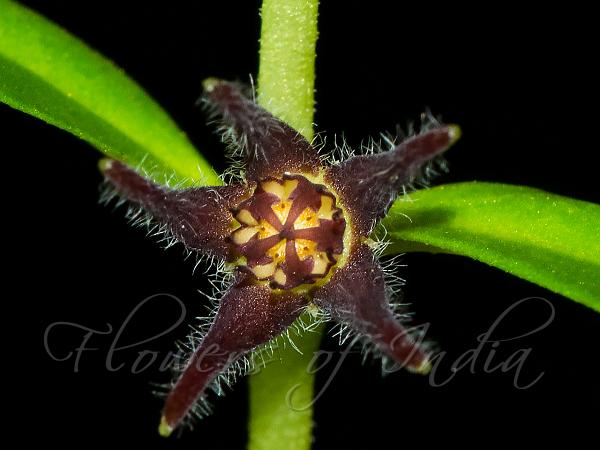|
| Ariyittapara Ceropegia |
|

|

| File size | 236869 |
| Original date | 8/16/20 10:17 AM |
| Resolution | 1293 x 1293 |
| Flash | Flash fired, return detected |
| Focal length | 90.0mm |
| Exposure time | 1/200s |
| Aperture | 14.0 |
| Focus Distance | |
| Metering Mode | Multi-segment |
| Camera make | NIKON CORPORATION |
| Camera model | NIKON D7100 |
| Sensor type | OneChipColorArea |
|
|
|
|
Photo: |
Botanical name: Ceropegia ariyittaparensis Family: Apocynaceae (Oleander family)
Ariyittapara Ceropegia is a newly discovered (year 2020)
plant from Kerala. It is an erect tuberous perennial
herb, with stems 1 or 2, erect, mostly unbranched, 4-20 cm x 1-2 mm;
internodes brownish-green, 0.5-1.5 cm long, with short whitish hairs.
It is named for the Ariyittapara plateau where is was first found.
Leaves are nearly stalkless, linear-elliptic, 1.5-4 cm x 2-4 mm,
pointed, finely velvet-hairy all over. Flowers ae borne in 1-3-flowered
stalkless clusters, with several brownish-green bracts 1.5-2 mm long.
Flower-stalks are 3-4 mm long, brownish-green, with short white hairs;
sepals pinkish-green, 1.5-2 x 0.5-0.6 mm, lanceshaped, pointed and
reflexed at tip, hairless. Flower are pinwheel shaped, 1.1-1.3 cm
across, green and hairless outside, tube shallow, bowl shaped, 0.5-1 mm
deep, 2-2.5 mm broad at mouth, inside yellowish green around
gynostegium changing abruptly to maroon towards mouth, hairless; petals
spreading, 1.3-1.8 mm broad at base, lanceshaped, 5-7 mm long, tapering
with curled margins; inside maroon and velvet-hairy with fine white
hairs 0.5-1 mm long, becoming hairless towards base. Corona is 1.8-2 x
1.3-1.5 mm, stalkless, hairless; outer lobes erect, each deeply
divided into two slender lanceshaped blunt lobules 1.5-1.8 mm long (so
as to appear 10-lobed) and exceeding rest of gynostegium, yellow with
deep pinkish-brown margin and tip; inner (staminal) lobes 0.8-1.1 mm
long, triangular-lanceshaped, blunt, deep pinkish, connivent, adpressed
to backs of anthers, exceeding them to meet in the centre and rise up
in small column above style-head, broadening basally towards the outer
corona. Seedpods are usually paired, 12-18 cm x 1.5-2.5 mm, narrowly
spindle-shaped, greenish-brown. Ariyittapara Ceropegia is only
reported from the Kasaragod District of Kerala.
| Identification credit: Sushant More | Photographed in Kasaragod District, Kerala. |
• Is this flower misidentified? If yes,